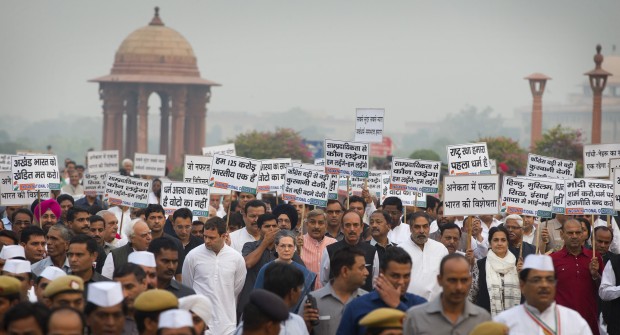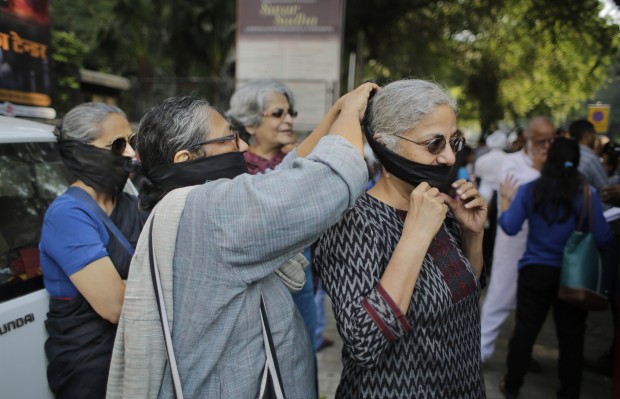Over 40 writers return Indian awards in protest over rising intolerance

Indias opposition Congress party president Sonia Gandhi, center in blue leads a march of party leaders to the Presidential palace in New Delhi, India, Tuesday, Nov. 3, 2015. The Congress party appealed to President Pranab Mukherjee to use is constitutional powers to end the repeated instances of intolerance attacks in the country. Several instances of intolerance attacks have been reported recently in India, including the killings of three atheist scholars who had campaigned against religious superstition, and mob killings over rumors of cow slaughter or smuggling. Banners in Hindi read, “Don’t break united India, Religion is of faith not for politics, Hindu, Muslims, Sikhs and Christian all are brothers, Modi Government shame shame stop politics. Unity in diversity is India’s speciality.”(AP Photo/ Manish Swarup)
Recently over 40 writers, filmmakers and academics returned their awards in protest over rising intolerance in India. Latest joining in, renowned South Asian writer Arundhati Roy returned her National Award for Best Screenplay on Thursday, which she had won in 1989.
Returning her award, the Booker Prize winner said that she was “so proud” to join the writers, filmmakers and academics, who have returned their awards to protest against attacks on minorities, murder of rationalists, threats to free speech, enforcement of beef bans, and the vicious remarks by leaders of the Bharatiya Janata Party and the Rashtriya Swayamsevak Sangh.
Roy issued a statement on Thursday explaining her decision to return the 1989 National Award she received for Best Screenplay, saying, “I want to make it clear that I am not returning this award because I am ‘shocked’ by what is being called the ‘growing intolerance’ being fostered by the present government.”
Lamenting the loss of the right to speak freely, she says, “It doesn’t matter whether we agree or disagree with what is being said. If we do not have the right to speak freely we will turn into a society that suffers from intellectual malnutrition, a nation of fools.”

In this Oct. 23, 2015 file photo, an Indian writer assists another with tying a black band around her mouth as a mark of protest before participating in a silent protest march outside Sahitya Akademi, or National Academy of Letters, in New Delhi, India. The chorus of Indian intellectuals protesting religious bigotry and communal violence grows louder by the week with a single message for prime minister Narendra Modi: assure the multicultural nation that the government stands for secularism and diversity. Those protesting are angry and worried by a spate of deadly attacks against atheist thinkers and minorities, and by Modi’s relative silence through it all. (AP Photo/Altaf Qadri)
Since Narendra Modi came to power, the incidents of intolerance have increased by a large margin. Recently a gang of thugs attacked a book launch in Mumbai, provoking India’s literati to take a step to prevent the lack of freedom of thought, speech and practice, and resulting in dozens of writers returning India’s highest literary honor to protest the growing climate of intolerance in the country.
In October, Nayantara Sahgal, niece of India’s first Prime Minister Jawaharlal Nehru caused an uproar when she handed back her ‘Sahitya Akademi Award’ which is bestowed by the government to honor India’s leading writers.
Many other writers followed suit and many more came out in support, including poet, writer Javed Akhtar. Even the controversial Indian-born writer, Salman Rushdie weighed in on the issue, saying: “I think what’s crept into Indian life now is a degree of thuggish violence, which is new. And it seems to be, I have to say, given permission by the silence of official bodies… by the silence of the prime minister’s office.”
He added, “Modi is a very talkative gentleman, he has a lot to say on a lot of subjects and it would be very good to hear what he has to say about all this.”
As the unrest grows, the number of activists protesting increases proportionately. Though, how the Modi government deals with it, remains to be seen.
























































